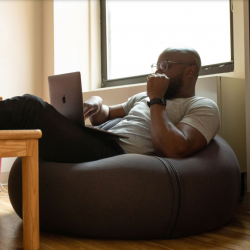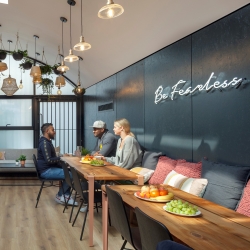To provide the best experiences, we use technologies like cookies to store and/or access device information. Consenting to these technologies will allow us to process data such as browsing behaviour or unique IDs on this site. Not consenting or withdrawing consent, may adversely affect certain features and functions.
The technical storage or access is strictly necessary for the legitimate purpose of enabling the use of a specific service explicitly requested by the subscriber or user, or for the sole purpose of carrying out the transmission of a communication over an electronic communications network.
The technical storage or access is necessary for the legitimate purpose of storing preferences that are not requested by the subscriber or user.
The technical storage or access that is used exclusively for statistical purposes.
The technical storage or access that is used exclusively for anonymous statistical purposes. Without a subpoena, voluntary compliance on the part of your Internet Service Provider, or additional records from a third party, information stored or retrieved for this purpose alone cannot usually be used to identify you.
The technical storage or access is required to create user profiles to send advertising, or to track the user on a website or across several websites for similar marketing purposes.
![]() The British Chambers of Commerce (BCC) has released new figures suggesting that over two thirds (66 percent) of businesses surveyed now offer flexible working to employees. The data, from a survey of over 900 businesses conducted in April 2021, also shows nearly three quarters of businesses expect to have at least one employee working remotely over the coming year, with the average expectation among those firms being just over half of their employees working remotely. (more…)
The British Chambers of Commerce (BCC) has released new figures suggesting that over two thirds (66 percent) of businesses surveyed now offer flexible working to employees. The data, from a survey of over 900 businesses conducted in April 2021, also shows nearly three quarters of businesses expect to have at least one employee working remotely over the coming year, with the average expectation among those firms being just over half of their employees working remotely. (more…)





 As lockdown starts to lift, more people are having to think about going back to work as normal. That means commutes, offices, cafeterias, and face to face meetings.
As lockdown starts to lift, more people are having to think about going back to work as normal. That means commutes, offices, cafeterias, and face to face meetings. 
 More than a year after the coronavirus was first reported the UK, the impact on business is undeniable. Research conducted by
More than a year after the coronavirus was first reported the UK, the impact on business is undeniable. Research conducted by 
 Corporate wellbeing could add £61bn to the English economy by 2025 through added productivity, if UK companies can create new wellbeing strategies and improve underperforming ones, according to a new study by
Corporate wellbeing could add £61bn to the English economy by 2025 through added productivity, if UK companies can create new wellbeing strategies and improve underperforming ones, according to a new study by 
 A new in-depth
A new in-depth 
 The impact of the nation’s deteriorating mental health from Covid-19 lockdowns and other restrictions cost UK businesses £14bn last year, according to a study by
The impact of the nation’s deteriorating mental health from Covid-19 lockdowns and other restrictions cost UK businesses £14bn last year, according to a study by 
 Let’s be honest, work life pre 2020 had its flaws, whilst the longing for variety of scenery, change of pace and even a train journey (somewhere…ANYWHERE) would be welcomed by many of us right now, many of us had become a bit ‘hamster wheel’ in our approach. Commuting was stressful, expensive and time hungry; our natural and individual rhythms squeezed into a set 9-5 schedule and workplace design had become a bit ‘quantity over quality’ – desks have been reducing in size year upon year in order that capacity could be increased. We had reached a point at which everything was ripe for change but there was largely a resistance to both flexible working requests and embracing much of the technological advancements that were already at our fingertips.
Let’s be honest, work life pre 2020 had its flaws, whilst the longing for variety of scenery, change of pace and even a train journey (somewhere…ANYWHERE) would be welcomed by many of us right now, many of us had become a bit ‘hamster wheel’ in our approach. Commuting was stressful, expensive and time hungry; our natural and individual rhythms squeezed into a set 9-5 schedule and workplace design had become a bit ‘quantity over quality’ – desks have been reducing in size year upon year in order that capacity could be increased. We had reached a point at which everything was ripe for change but there was largely a resistance to both flexible working requests and embracing much of the technological advancements that were already at our fingertips. 
 New research from Opinion Matters, commissioned by
New research from Opinion Matters, commissioned by 
 The COVID-19 pandemic left businesses in an unprecedented position of having to rapidly adapt workplace practices and implement new processes at a moment’s notice. Of course, those companies that were already accustomed to home office set-ups and flexible hours were in a much better place to adapt to these changing circumstances. However, not all businesses were prepared for the sudden change to work routines.
The COVID-19 pandemic left businesses in an unprecedented position of having to rapidly adapt workplace practices and implement new processes at a moment’s notice. Of course, those companies that were already accustomed to home office set-ups and flexible hours were in a much better place to adapt to these changing circumstances. However, not all businesses were prepared for the sudden change to work routines. 
 With the continuous impact of the pandemic on people’s mental health due to isolation, work uncertainty, and anxiety over health, the topic has been dominating the news, begging the question of how we can achieve accessible and cost-effective treatment for all and prevent the expected acceleration of mental health issues in the coming months. As we juggle a different type of work-life balance brought about by working from home and the added worry of how the pandemic is affecting us, there is no doubt that our daily lives have been disrupted. The statistics are alarming;
With the continuous impact of the pandemic on people’s mental health due to isolation, work uncertainty, and anxiety over health, the topic has been dominating the news, begging the question of how we can achieve accessible and cost-effective treatment for all and prevent the expected acceleration of mental health issues in the coming months. As we juggle a different type of work-life balance brought about by working from home and the added worry of how the pandemic is affecting us, there is no doubt that our daily lives have been disrupted. The statistics are alarming; 
 Research published by
Research published by 







May 20, 2021
The pandemic will transform the way we commute
by Tim Burgess • Comment, Flexible working, Wellbeing